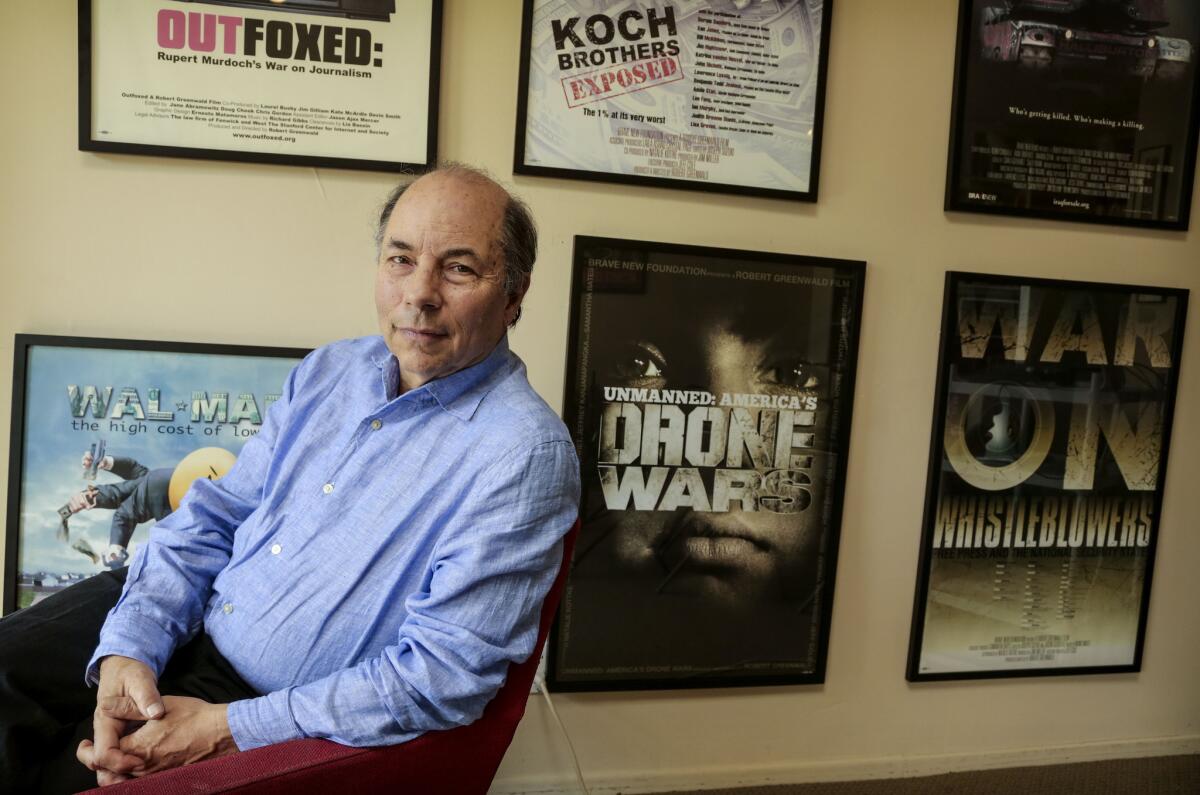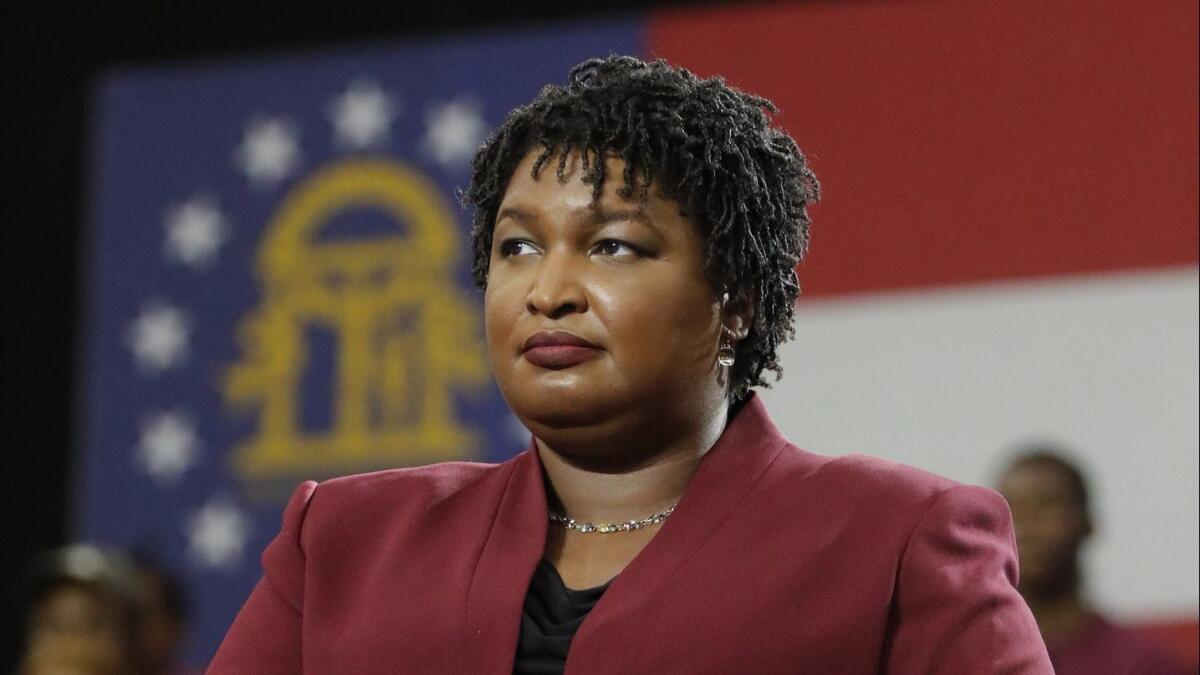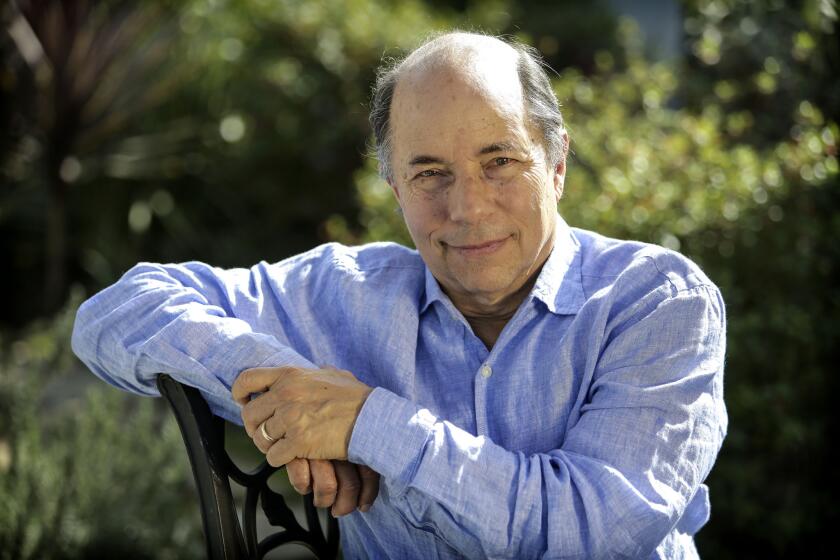New voting rights documentary targets #hashtag, Facebook audiences ahead of 2020 election

- Share via
Robert Greenwald’s new film about voter suppression is politically urgent, but to get it noticed in the competitive world of guerrilla-style documentaries he must target audiences across Facebook, Twitter, Instagram and video gamer sites.
The media landscape is atomized, and audiences with voracious, if fleeting, interests are forcing documentary filmmakers with tight budgets to be creative in cyberspace as well as in more traditional realms such as church congregations and independent bookstores. It is a marketing alchemy of feeds, hashtags, likes, favorites, hearts, @s, memes, soundbites and video clips, all edited, spliced and calibrated to grab attention in a hyperspeed world.
“It’s hard,” admitted Greenwald. “What we put on Facebook is going to be different than what we put on Twitter, which will be different from what we put on our website, which will be different from what we’ll be doing on Instagram. Different formats, different lengths. For Facebook you have to have text in the first 15 seconds because so many people are watching on their phones at work and they don’t have the sound on. Knowing that’s a big deal.”
In the weeks leading to the Sept. 24 release of “Suppressed: The Fight to Vote,” Greenwald and his staff at Brave New Films have refined trailers and messages. Much of the publicity campaign — rolled out from a whitewashed building in Culver City not far from Sony Pictures — focused on social media. But it also aimed at college campuses, legislators, activist groups, the League of Women Voters and churches in Georgia, where the film exposes voter registration and polling tactics that discriminate against people of color.
“Trump has us alternating between rage, fury and pain,” Greenwald told 18 producers, digital developers and others crammed into his office. “So voting becomes important against humongous attempts to fight against and suppress the vote. We’re talking about Georgia, but it’s a national issue. So how do we get that out on Twitter and other places?”
“Are we doing an extra trailer?” asked Danielle Cralle, social media manager. “Trailers get people excited. Treat it like a mini-launch.”
“We could put Facebook ads around it,” said Jill Ettinger, director of strategy and distribution.
“I want to be pretty tough about deadlines at this point,” Greenwald said. “Do you need anything? Money. . . Casey [Cooper Johnson] you look worried.”
“I’m not worried,” assured Cooper Johnson, a producer.
Documentary filmmaking has flourished in recent for years. Technology has lowered production costs, made shooting (films can be recorded on smartphones) easier, and infused a populist fervor among #GoFundMe directors and writers to reveal the world’s ills and injustices. Streaming platforms are hungry for documentaries, creating a helter skelter atmosphere for hundreds of films each year trying to penetrate the noise and rise above the fray.
“Technology has changed everything for us,” said Greenwald, who made TV and feature movies for decades before switching to documentaries. “The challenge has gotten radically hard over the last three years because so many people are out there. There are the big dogs like Netflix. There are social media. And the gamers, who are a big thing now. The gamers are their own social network, and social networks become the strongest glue.”
The rollout for Robert Greenwald’s new documentary, “Making a Killing: Guns, Greed and the NRA,” is targeting pastors, politicians, domestic violence counselors, African American leaders and others angry over the high body counts and broken lives that have shaken cities and seeped across the heartland.
Brave New Films embodies an activist spirit. Its documentaries — running from a few minutes long to feature-length movies, and posted on YouTube and the company’s website — examine immigration, gun violence, gang life, affordable housing and wealthy tax dodgers. A two-minute clip Greenwald produced on immigrant children separated from their parents at the border drew 1 million web impressions.
The films are made on budgets ranging from $25,000 to $750,000, with funding coming from foundations, grants and private donors. Greenwald’s most provocative documentaries include ones about conservative bias in Fox News, low wages Walmart pays its employees, and the political power and money wielded by the National Rifle Assn. in an age of alarming gun violence.
The son of a psychologist and grandson of a union organizer, Greenwald, who grew up in New York City, was taught early to look beyond one’s self-interest. His office is lined with movie posters and scattered with books with titles like “Twitter and Tear Gas” and “The Attention Merchants.” His creed for filmmaking and life is distilled in an Ernest Hemingway quote attached to his desk: “Write the story. Take out all the good lines and see if it still works.”
His foray into documentaries began around 2001 when filmmakers Richard Ray Perez and Joan Sekler showed up at his offices with bags of video cassettes containing footage that would turn into “Unprecedented: The 2000 Presidential Election.” Perez and Sekler spent months editing footage on one of the most flawed elections in U.S. history. Greenwald — who constantly poked his head in — became an executive producer.
“I focus on the issues that are systemic but are not getting attention,” said Greenwald, who has the soft voice of a confessor. “There are horrible things that happen on the hour, and other people are following those. But I want to connect the dots to show how the system is working on incarceration, immigration, inequality or voter suppression. We want to put a face on policy. Is there a story to be told, and can we add something that isn’t being done and make it impactful?”

“Suppressed: The Fight to Vote” examines Georgia’s close 2018 election between Republican Brian Kemp and Democrat Stacey Abrams, who was seeking to become the country’s first African American woman governor. The 37-minute documentary lists problems of long voting lines, uncounted absentee ballots and how Kemp, who at the time was secretary of state overseeing the voting, put more than 53,000 voter registrations on hold until after the election. Eighty percent of those were filed by black residents. Kemp became governor.
“Pull back that veneer and you see something really rotten happening. It’s almost like termites,” Carol Anderson, professor of African American Studies at Emory University, says in the film. “We’ve got to understand this isn’t a Klan cross burning. This stuff is very bureaucratic. It’s very mundane. It’s very routine. But it is lethal.”
That system jeopardizes civil rights and fair elections. The partisan redrawing of congressional districts has diluted minority blocs and given Republicans an edge nationwide. Voter protections were further threatened in 2013, when the Supreme Court weakened the 1965 Voting Rights Act, which had ensured blacks could register and vote after generations of discrimination. Over the last seven years, the film reports, Georgia has closed 214 polling stations, 75% of them in majority black communities.
Robert Greenwald turns his lens on drone warfare in ‘Unmanned’
The documentary, which cost roughly $200,000, will premiere in Atlanta and then be rolled across social media platforms, including Instagram TV and Facebook Live events. It will be shown in Washington, D.C., as part of a congressional briefing and at the Baltimore International Black Film Festival. An Oct. 3 screening is set for the First AME Church in Los Angeles.
“Our priority is that people see our film,” Cralle said. “To do that on Twitter, you jump in on conversations. Stacey Abrams was trending on Twitter today after announcing she wasn’t going to run for the Senate. So we pushed our meme about her praising the film.”
In a divisive America, where clamor drowns out thoughtful discourse and politics is blood sport, changing minds and winning converts are not easy.
“We won’t get the percentage of people who believe Trump and racism are their tribe,” Greenwald said. “We need to get the low-information and undecided folks, and the people who are informed but aren’t taking action. You have to make them see these policies affect their lives. Our job is to motivate them and get them to do something. The persuade-ables. Not to yell and scream or be louder than anybody else, but to present information in a way that engages.
“You can build the wave or ride the wave. We prefer to build it.”
More to Read
The biggest entertainment stories
Get our big stories about Hollywood, film, television, music, arts, culture and more right in your inbox as soon as they publish.
You may occasionally receive promotional content from the Los Angeles Times.












